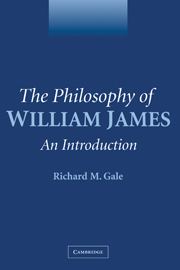Book contents
- Frontmatter
- Contents
- Preface
- Introduction
- PART I THE PROMETHEAN PRAGMATIST
- 1 The Ethics of Prometheanism
- 2 The Willfulness of Belief
- 3 The Freedom of Belief
- 4 The Will to Believe
- 5 The Ethics of Truth
- 6 The Semantics of “Truth”
- 7 Ontological Relativism: William James Meets Poo-bah
- PART II THE PASSIVE MYSTIC
- Bibliography of Works Cited
- Suggested Further Readings
- Index
5 - The Ethics of Truth
Published online by Cambridge University Press: 06 January 2010
- Frontmatter
- Contents
- Preface
- Introduction
- PART I THE PROMETHEAN PRAGMATIST
- 1 The Ethics of Prometheanism
- 2 The Willfulness of Belief
- 3 The Freedom of Belief
- 4 The Will to Believe
- 5 The Ethics of Truth
- 6 The Semantics of “Truth”
- 7 Ontological Relativism: William James Meets Poo-bah
- PART II THE PASSIVE MYSTIC
- Bibliography of Works Cited
- Suggested Further Readings
- Index
Summary
This chapter will show how James's Master Syllogism entails a theory of truth that makes the true a species of the good. This moralization of truth is James's most bold and original doctrine and will be found to be well deserving of our admiration if not our total acceptance.
To begin with, it can be shown that the conclusion of James's Master Syllogism
3. We are always morally obligated to believe in a way that maximizes desire–satisfaction.
in conjunction with other of his doctrines, entails that a proposition is true when believing it maximizes desire–satisfaction. Here's how the deduction goes. James defines truth as “what we ought to believe” and then asks rhetorically, “Ought we ever not to believe what it is better for us to believe?” (P 42). When the implicit claim that
4. The true is what we ought to believe.
is conjoined with 3 it makes for another valid syllogism, whose conclusion is
5. A proposition is true when believing it maximizes desire–satisfaction.
This could be called James's “Truth Syllogism.”
Another way of deriving 5 from 3 is to conjoin James's slogan that
6. “The reasons why we call things true is the reason why they are true” (P 37).
with his claim that
7. The reasons why we call something true is that our belief in it has proven satisfactory.
Given that, for James,
8. Being satisfactory is maximizing desire–satisfaction.
it follows again that
5. A proposition is true when believing it maximizes desire–satisfaction.
James never explicitly asserted either the Master Syllogism or the Truth Syllogism, even though the premises of both clearly are defended in his text.
- Type
- Chapter
- Information
- The Philosophy of William JamesAn Introduction, pp. 94 - 111Publisher: Cambridge University PressPrint publication year: 2004



